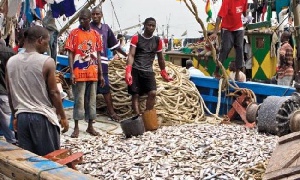 Participants of the fisheries dialogue pleaded with government to bring sanity to the industry
Participants of the fisheries dialogue pleaded with government to bring sanity to the industry
Participants at a day’s Fisheries stakeholders dialogue meeting have expressed worry about the politicization of pre-mix fuel issues and other inputs for the development of the fishing industry.
They noted with concern that the politicization of issues concerning fishing have made it difficult to fight bad fishing practices, such as fishing with chemicals, using undersized fishing nets, as well as using light to fish.
The participants expressed the sentiments during a fisheries stakeholders Dialogue organized by DAASGIFT Quality Foundation and funded by Star Ghana and UKaid at Agona Nkwanta in the Western Region.
The meeting attended by more than 50 chiefs, fishermen, fish processors and officials from district assemblies drawn from Shama, Axim and Ellembelle districts was held under the theme: “Enhanced coordination and collaboration of fishermen councils and fish processors association for effective co-management”
The event was held to find a lasting solution to a long standing gap in the fisheries management and decision making structure which is being dominated by males.
The participants were of the view that if the fishing industry would grow it would be imperative to involve women particularly fish processors at all levels of decision making both at the national and district levels.
They also asked that the government should enforce all the laws governing the fishing industry, this they said, would bring sanity and help curb the fast depleting fish stocks.
The participants suggested that fisheries commission units should be created at the various costal districts, this they noted would help enhance the activities of fishermen and fish processors.
Mr Alex Sarbah, Regional Director of Fisheries Commission, urged fishermen to move from the blame game that the find of oil in commercial quantities in the region had resulted in fish stock depletion and put in place good fishing practices devoid of illegalities such as the use of undersize net, fishing with light and chemicals.
He said his outfit was ready to assist fishermen in their work despite the inadequate staff of the commission, stressing that there were more than 400 fishing communities in the region with only about 20 staff of the commission.
The Regional Director also expressed concern about the poor sanitation situation along the beaches and landingbays and taskedthe chief fishermen and fish processors to be up to the task.
Mr Sarbah who spoke on “ How does the Draft Co-Management policy impact on the livelihoods of fishermen and fish processors, said the draft which would soon be put before Parliament would help with the creation of management committees and community watch volunteers to manage the various fishing communities.
Mrs Gifty Baaba Asmah, Executive Director DAASGIFT Quality Foundation, said gender equality in fisheries management and decision making was a critical path to ensure food security.
She expressed concern that women constituted more than 50 percent of the fisheries workforce and pre-finance most fishing expedition as well as play key roles in post- harvest fish sale and processing but were not well represented in the fisheries management and decision-making process.
“Their decisions, choice and fate are taken by the fishermen without their involvement or voice”, this situation she attributed to the perception that fishing was a male dominated field.
“In Ghana, the role of men and women in the fishing sector is highly defined by traditional gendered roles, men go to fishing so they are the main players in fishing and women just process and market the men’s catch, and there is no business for the women if the men do not bring the fish from the sea.”
Obrempon Ohen Dekyi XIV, Paramount chief of Upper Dixcove, commended DAASGIFT Quality Foundation for its project, saying it has been an ‘eye opener’ to the fishing communities and urged them to extend the programme to the rest of the costal districts in the region.